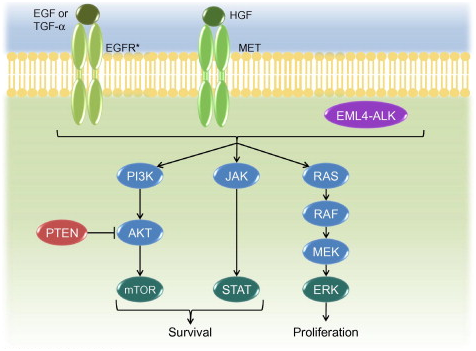EML4-ALK

EML4-ALK positive lung cancer is a medical term that refers to a primary malignant lung tumor whose cells contain a characteristic abnormal configuration of DNA wherein the echinoderm microtubule-associated protein-like 4 (EML4) gene is fused to the anaplastic lymphoma kinase (ALK) gene.This abnormal gene fusion leads to the production of a protein (EML4-ALK) that appears, in many cases, to promote and maintain the malignant behavior of the cancer cells.The transforming EML4-ALK fusion gene was first reported in non-small cell lung carcinoma (NSCLC) cell 2007 non-small-cell lung cancer.EML4-ALK gene fusions occur almost exclusively in carcinomas arising in non-smokers.EML4-ALK mutations rarely occur in combination with K-RAS or EGFR mutations.
EML4-ALK occurs most commonly in a unique clinical subgroup of NSCLC patients. Apart from rare exceptions, EML4-ALK and EGFR mutations are mutually exclusive. EML4-ALK translocations tend to occur in younger patients and those with more advanced NSCLC while this relationship has not been reported for EGFR mutant NSCLC. Initially, the EML4-ALK fusion gene was identified in a smoker with lung cancer; however, the accumulating evidence reveals that this genetic alterations is much more common in never/ former light (often defined as ≤ 10 pack years and quite ≥ 1 year ago) smokers with NSCLC. Reverse transcriptase (RT)-PCR is a potentially rapid diagnostic method for identifying ALK translocated NSCLCs. A theoretical advantage of this technique is its extreme sensitivity for detecting mutant transcript and the presence of any amplification product implies an ALK rearrangement.The initial studies reporting on the discovery of EML4-ALK raised the possibility that inhibiting the kinase activity of ALK may be an effective clinical therapy. Furthermore, transgenic mice expressing EML4-ALK in the lung epithelium develop numerous lung adenocarcinomas demonstrating the oncogenic nature of this fusion gene. Preclinical studies demonstrate that EML4-ALK NSCLC cell lines undergo downregulation of critical survival signalling pathways and apoptosis when treated with an ALK kinase inhibitor.
Crizotinib is the most advanced ALK inhibitor in clinical development. In a retrospective case-match analysis, ALK-positive NSCLC patients had a longer overall survival rate after crizotinib as second-or third-line therapy.


